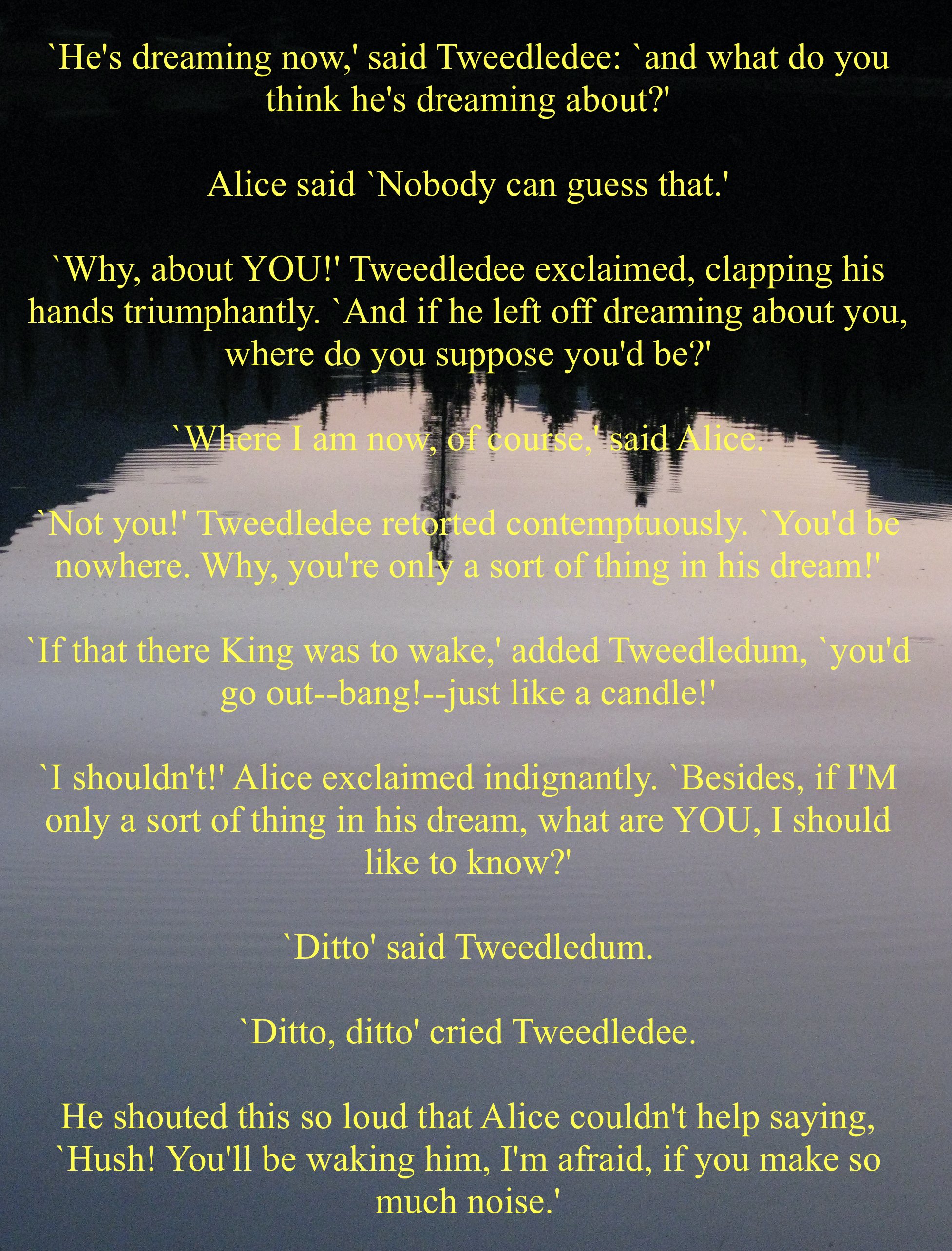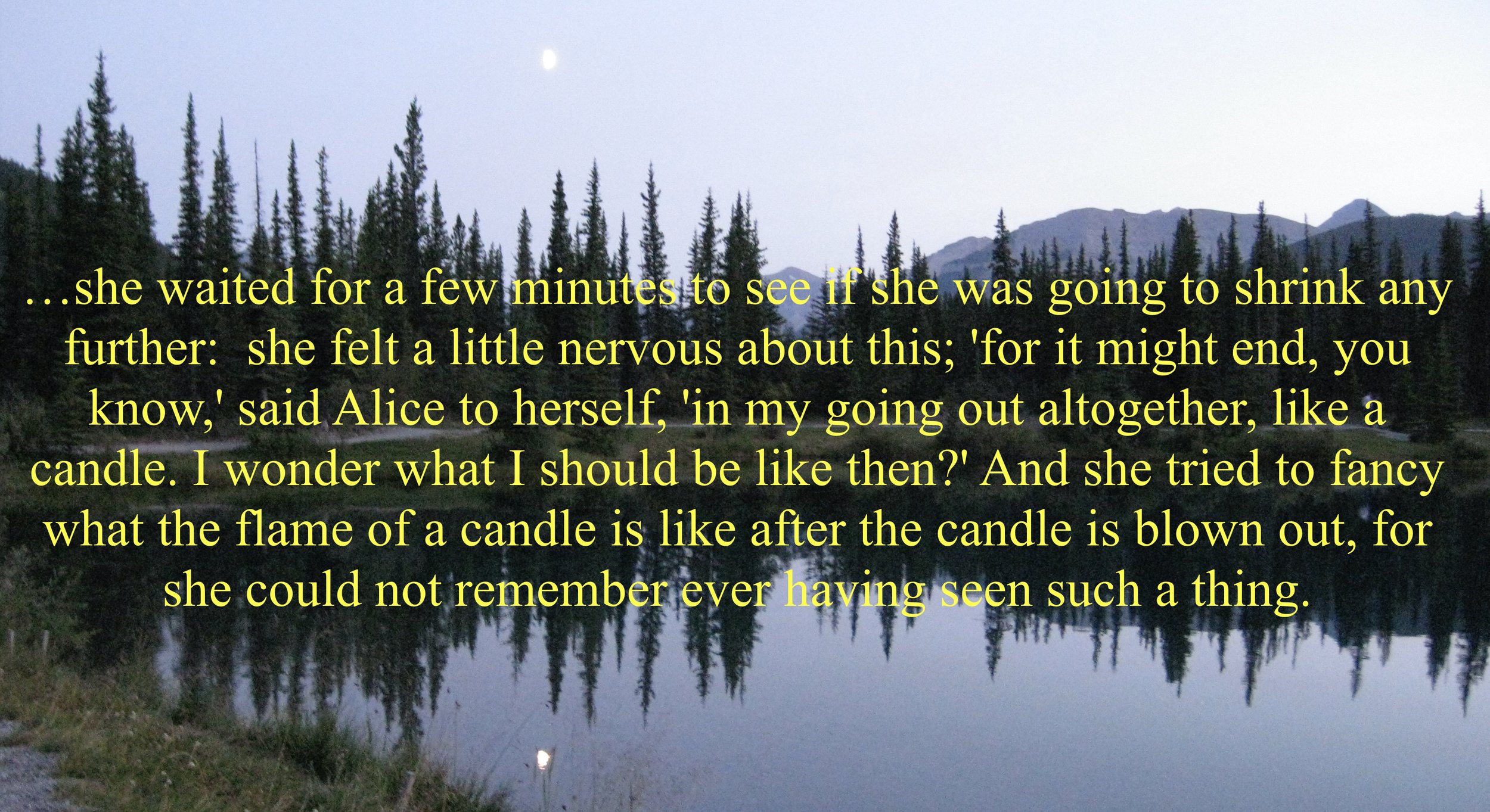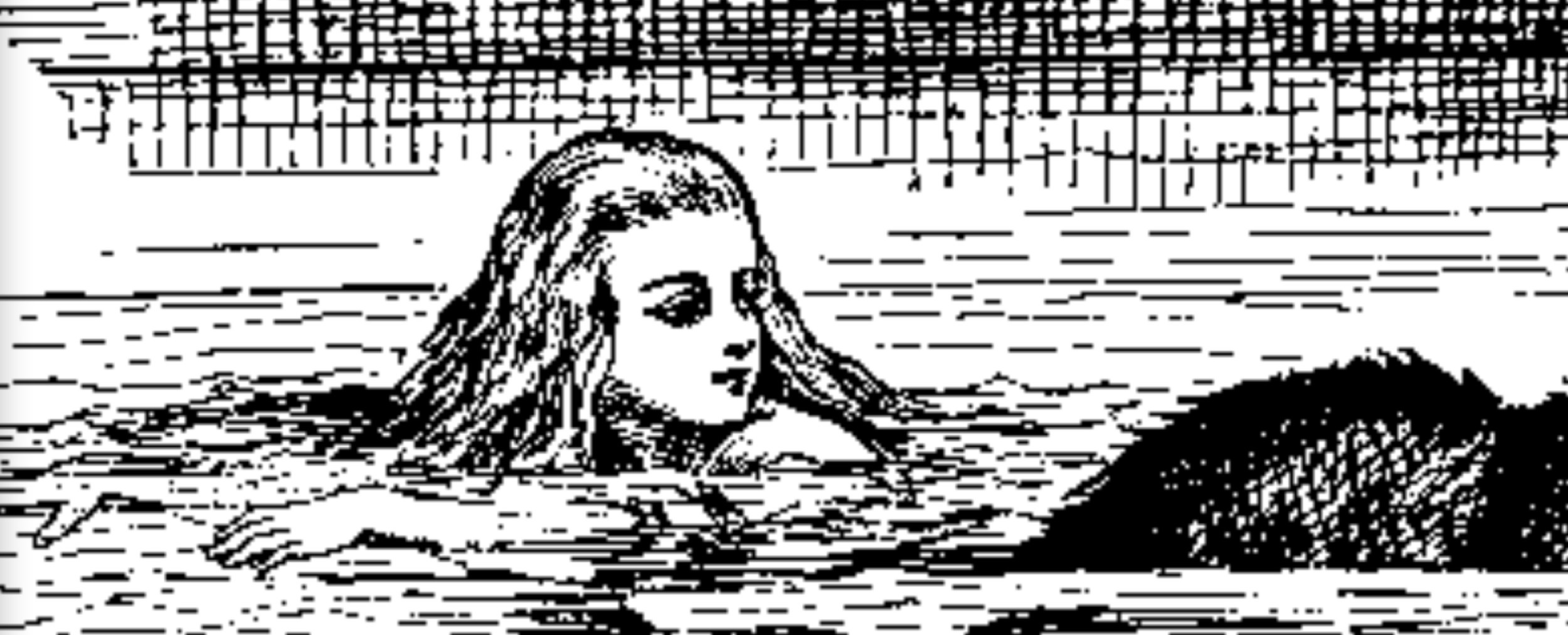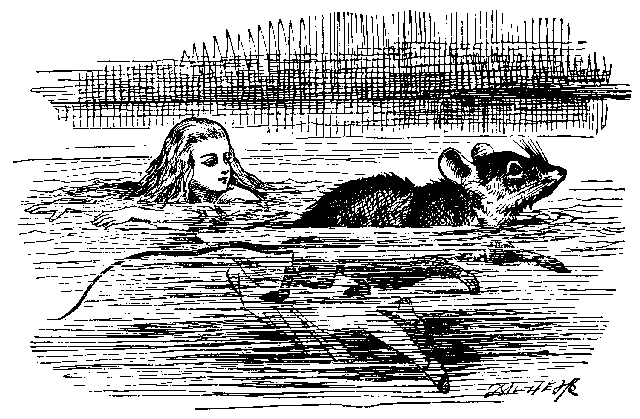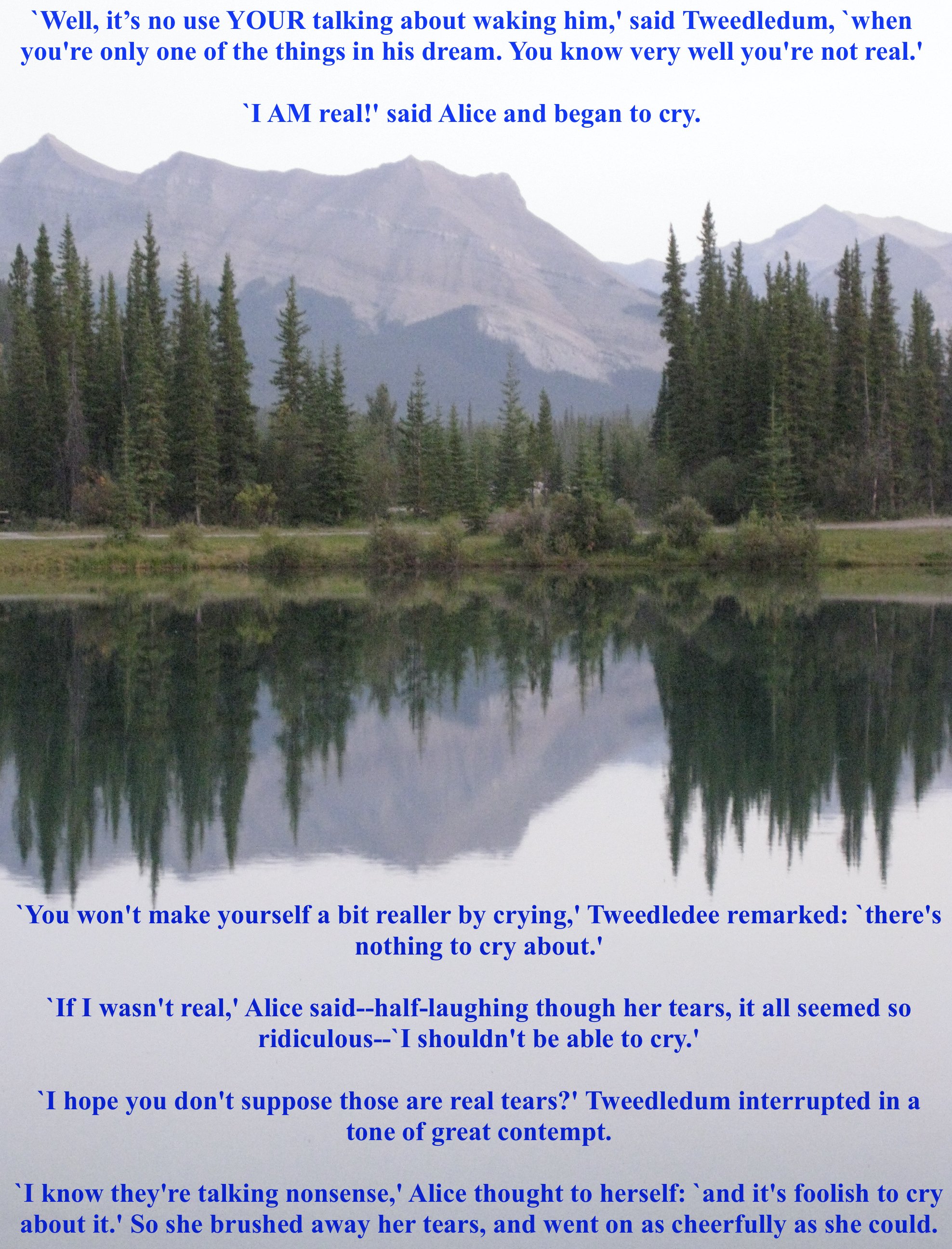Fairy Tales 🧚 Alberta
Dreamer
🧚♀️
🧚♀️
As he floated on the goose down of his dreams, Baldric swooped down over this bas-monde, catching a glimpse of his beloved in the twilight of an alley. He saw her heart catch upon her breath as her dark hair flowed toward his eyes like the void of a black hole in the corner of the sky.
Yet in the harsh light of day Baldric couldn’t remember her face. Tenniel helped somewhat, since his drawings of Alice seemed spot on — except of course that he started the fad of making her blonde, even though the historical Alice Liddle was brunette. All of this merely confirmed to Baldric that his brunette Alice was in fact the true, original Alice.
Despite his beauty salon tricks, Tenniel got the spirit of Alice right: the confident way she swam in a flooded world; the perplexed way she held a pig that wasn’t her own (and might have been a baby were it not for the insanity of the mother); and the innocent way she upset the world of her parents with a single postcard, just as she upset Baldric’s world with a single look:
Leafing through the old illustrated volume of Alice’s adventures made Baldric think back to his childhood, back to the days of jolly jumpers and violent duels over the kitchen table. Yet why did his mother say that he would meet Alice in a small town in the Province of Yunnan? And why was Alice ripping up the Queen of Hearts and stuffing jokers up her sleeve? And where on earth was the Province of Yunnan?
One question lead to another, and soon Baldric was lost amid the crowd his parents had introduced to him in his childhood: Alice & the White Rabbit, the Walrus & the Carpenter, the Jack of Hearts & the Mad Hatter, Peter Pan & Wendy, Bluebeard & Mary Poppins, Strider & the Orcs, the Walrus’ friends & the Captain's drinking buddies, a Laughing Tea-Set & Jack the Ripper. Soon there was a whole cast of characters flying, drinking and eating into Baldric’s mind.
As a child Baldric often asked his mother about the relation between the characters. Did they follow one plot? Clearly they each had their own story, but was there also one Grand Story into which they all fit? This brought a glint into Beatrice’s eye, a glimpse of Hope that life might in fact have a greater, higher meaning. If so, how might all the stories come together? How might the Grand Plot work? Might it be the Ideal Story described by Plato and Plotinus, the greatest fantasy writers of them all?
For just such an occasion Baldric’s mother supplied Baldric with an empty folio of 1001 pages. She put it discreetly under his pillow, and told him to write in it whenever he felt dissatisfied by the way that Lewis Carroll, Tolkien, James Barrie, Shakespeare, Moses, or C. S. Lewis ended their stories. She hoped that he’d add chapters, and perhaps even find a technique using grammatical stops, comma splices, and conjunctive samsara loopholes to make the stories go on and on, like the evening news.
At the back of the folio, Beatrice included an Unconditional Artistic License, which allowed Baldric to compete with the greatest minds of the universe. The only condition on the back of this license was that he must mimic the egocentric vagaries of postmodern novelists and express himself in convoluted passages of mythic poetry. In this way, if his writings were discovered by the infamous Blacklister, then the ogre wouldn’t be able to decipher their meaning. Baldric was thus safe to climb up and down the beanstalk of his fancy, and both he and his mother escaped the wrath of the giant and his six-foot ax.
The constant pressure to render Rabelais and Shakespeare obsolete was hard on the 14-year-old boy. By the time he started grade 9, he was already spending most of his waking hours dreaming other lives that were somehow connected with his own. Yet he was determined not to drown under the weight of his accumulated fantasies. Precocious, he soon learned to swim like a cod fish in the waters of his imagination. He learned to twist this way and that, wherever the fins of his thought inclined. The more time he spent under water, the more he could hold his breath, and could blow up any given fact of life into a fictional scenario.
In time, he could take a single thought, force it out from his lungs, and project it up in a single bubble from the bottom of the public swimming pool. The bubble started out small but it grew in dimensions of narrative until it exploded underneath an air mattress. On top of this mattress was a fat Greek man who was lying on his back with a copy of Scientific American in his hands. The man was pretending not to notice the lifeguard next to the shallow end, deep as he was in the study of spectroscopy and body parts. The man had in fact created a fantasy of his own, which involved a water bed, a curly-haired Adonis, an X-Ray machine, and a vat of honey which he poured slowly onto the ruffled baclava of the life-guard’s abdomen. The fat man was so surprised when the fictitious world exploded beneath him that his water mattress flipped over. He slid in a frenzy of yearning to the bottom of the pool, nearly crushing Baldric on his way down. His face flushed scarlet as his hands fumbled and failed to grab onto Baldric’s swimsuit.
After that incident, Baldric bought a mask and a snorkel, and took to the open water. But in mid-summer the lakes became clogged with minnows, and stainless steel hooks began to pluck at his skin and give him permanent goose bumps. In order to escape these, he told his father that he was tired of being a big fish in a small lake. He told the old goat that he wanted to get into the ocean so he could apprentice under the cruel eye of the shark.
🧚♀️
Excited by this prospect, Antonio took Baldric and Beatrice for the weekend to the West Coast, where they rented a three-tiered eyrie in the North Vancouver suburb of Eagle Ridge. From his ‘Condor’s Nest’ high above the marina, Antonio could spot the hapless morsels that scurried onto the jetties below. Beatrice also loved the location, since it was about ten kilometres from Keats Island. Renting a pink catamaran, she sailed round and round the island, hoping to discover a grotto in which she would find Beauty and Truth, a melancholy nightingale, and a sparkling glass of hemlock that would help her to cease upon the midnight with no pain. Barring this, she hoped to find a ravished bride of time, and somehow turn back the clock.
Baldric couldn’t wait to test the new, opener waters. Yet when he tried to push out from the jagged shoreline, he kept bumping his head on rocks. This made him imagine that the shoreline moved in and out, in and out, like a pile driver. He was also terrified by the spiky sea urchins laying in wait on the ocean floor. It was a paradox: as soon as he got beneath the raging waves and own into the calm depths, and down further where one could put one’s feet once again on solid ground, one was confronted with razor-sharp coral, spotted water hemlock, mushy silt that was worse than quick-sand, gelatinous octopi that changed colour and would clearly eat your soul if they figured out how, and a collection of innocuous-looking but deadly stinging jellyfish, and spiky sea urchins.
This reminded him of Alice and how she treaded water with the mouse. What if Alice tried to put her foot on solid ground, only to get punctured by a dozen nasty spikes? She couldn’t just kick these urchins away, for they had little suction cups on their tubular feet. He thought of Alicia and her journey across the Atlantic & the Mediterranean, the Arabian Sea & the Gulf of Siam. What if the world out there was like the urchin, and punctured her shoes each time she tried to set her foot on solid ground?
Her precarious situation reminded him of the song by Elton John that Antonio used to play whenever Beatrice tried to comfort her son with stories of Alice’s bravery. Beatrice told Baldric that Alice was a smart and proper girl, yet in the background, floating in the air from Antonio’s study, he heard, “Raised to be a lady by the golden rule / Alice was the spawn of a public school.” Spawn? A flower or a sunbeam, or even just a breath of fresh air. But a spawn?
Beatrice told Baldric not to pay any attention to the song. Instead, he should think about Alice as a speculative philosopher, one who was brave enough to question the very nature of reality:
Yet from the study Baldric heard, “Reality it seems is just a dream / She couldn't get it on with the boys on the scene / But what do you expect from a chick who's just sixteen.”
And then Baldric was terrified, for he had stopped listening to his mother and heard instead the fast hard guitar seducing him and the smooth driven voice of Elton john telling him that “All the young girls love Alice” and that her life was “like acting in a movie when you got the wrong part / Getting your kicks in another girl's bed / And it was only last Tuesday, they found you in the subway dead.”
Baldric couldn’t get the song out of his head. To drown out the sound, he plunged below the savage waves in a wet suit and a pair of aqualungs — a thick wet suit that even the most hardened urchin assassin couldn’t puncture. The aqualungs were also very handy: he no longer had to spring up thirty feet for air each time he went down, a stunt which tended to drive him around the various bends of the rocky shore as well as give him a throbbing headache, in and out, in and out, to the sound of a gigantic hollow sea shell with a man-eating caterpillar deep in its shiny pink throat telling him that the coroner was in the underground, on a subway car confirming that she had no pulse.
How in this world would she ever make her way?
How would Alice ever keep that steadfast calm that Tenniel saw in her at the beginning of her journey, when she kept her head even though she was swept away in the current of her imagination, after her precipitous fall had turned into a flood?
Where could her foot ever find solid ground?
And then Baldric remembered his mother trying to tell him that all he needed to do was this or that, but he no longer heard what she was saying because of the drumbeat and the acid guitar of the next song coming out of Antonio’s studio, the one he had heard a million times, the one that resounded deeper than all the others:
🧚♀️
Antonio saw that Baldric was trying to put up a brave front, but that he was being gnawed into a state of constant terror by poisonous jellyfish and strangling nooses of kelp. He therefore bought him a one-man submarine, which allowed him to plunge without danger down to the swaying roots of his fears and desires. There, among old galleons and nuclear submarines, Baldric could safely expose his thoughts to the harsh glare of modern psychological flashlights, which were stuck by supermagnets onto the outer walls of his diving machine. Turning the lights on full blare, he exposed the innermost, darkest corners of his life story to the rigorous analysis of postmodern history. It was in this subterranean world of indefinite pronouns that he realized ‘history’ and ‘his story’ were identical but for the stress put on one syllable or the next.
Deep in the underwater chambers of his mind, Baldric shot like a squid from one fossil and shipwreck of his story to the next. He also saw an incredible variety of floating and swimming, snorkeling and sinking specimens that lurked within the dark green waters.
Yet wherever he went in his wondrous underwater machine, he was delighted to discover that the substance of his fantasies were in no way baseless. His thoughts didn’t descend into bottomless caverns of water, but had their limits, like the rabbit holes into which Alice kept falling. Contrary to what he learned in kindergarten, the ocean floor had no trapdoors or ship-devouring whales. There wasn’t one single hole in the bottom of the sea.
There was nothing to worry about: be like Alice and swim with the current. Don’t worry about the contradictions. Just listen to the story of the mouse.
Juxtaposing his floating and sunken worlds, it wasn’t long before Baldric discovered the authenticity of fiction. He was of course not the first to discover this. For centuries, critics had dipped into the waters of the Aegean and the English Channel in submarines of various sizes. When they surfaced (too quickly, some would argue), they all agreed that fiction must necessarily find its point of origin in fact.
Yet what if the author had gone beyond fact and the five senses of John Locke? What if a thought that once roamed gently like a knight-errant across his mind now galloped violently on a steed of black and white print? And what if the knight on top of that horse started to dress in flowery prints, or if he set off in a direction all his own? And what if this knight wasn’t a caballero dashing across the rugged plains of northern Argentina, but a frustrated English teacher bouncing up and down on the ogo-pogo-stick of his lost childhood?
It was this last possibility that unhinged Baldric, for deep within an underwater cove he spotted another deep sea craft turning into yet another deeper, darker cove. Ragor’s face sported a wry smile as the crystal submarine was lost amid the kelp and gnarled rocks.
🧚♀️
When the family returned from their weekend on the coast, Baldric’s Math teacher told his parents that the boy’s mind had become unhinged. But Baldric refused to even debate this point with a man who spent three quarters of his adult life comparing triangles, equating letters with numbers, and talking about unknowns. From that day on Baldric trusted no one but opium-addicted poets, obscure philosophers, and rock stars to instruct him in the ways of the world.
Leibnitz was a great source of inner strength to the boy, for in his convoluted German way he reasoned that every particle of the universe had an intimate relationship with every other particle. This explained to Baldric why parts of his body felt close to parts of the bodies of the girls in his class.
Zhungzi went even further, suggesting that it didn’t matter if he was his own self or a complete stranger. The Chinese philosopher illustrated this by referring to a dream he had of being a butterfly. Ever since this dream he wasn’t sure if he was previously a man dreaming to be a butterfly, or whether he was now a butterfly dreaming to be a man. In the end, what did it matter? One could still alight upon the prettiest flower in the classroom.
Shankara, an Indian philosopher from the city of Bhang Galore, came up with an equally convenient idea. According to him, a snake was a metaphor for cosmic Dream or Illusion, but a rope was just a rope. To be walking along a jungle path and to be afraid of a rope on the ground was just a way of saying that you were paranoid and in need of psychoanalysis, or that you were a dreamer and should try to wake up.
Lauded by all the Hindus in the Indian subcontinent, Shankara made a billion people rise up into the air and believe that their lives were more than a nightmarish attempt to scratch out a living from the parched earth of their greedy landlords. They were merely dreaming their difficulties, merely entertaining the idea of poverty, just as Baldric’s father often entertained judges and gang leaders at home.
On a higher level of reality (presumably somewhere near the nose of the snake), Shankara asserted that people were on the same level as God. Everyone was in fact one with all things, whether they knew it or not.
Baldric concluded from this that he should also be one with the girls in his class and that he was justified to do all he could to connect himself to them. There were two caveats, however. First, although it wasn’t important for him to make a distinction between what was real and what was fake (that is, between the hemp snake and the levitating rope), it was important not to sleep with either around his neck. Second, it was also important to remember, whenever he was swimming in deep water, that at the bottom of the water, just where he felt he might alight on solid ground, there might also be a sea-snake.


